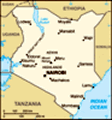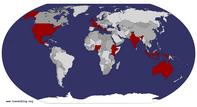Advertisement
Published: April 1st 2010
Ecstatic Elephants & Horny Rhinos Like a mystical revelation of sorts, a dreamland where things are real and others phantasmal, there was relief. It had been three days of torment—physical, mental, and hardly spiritual—traveling overland atop a lorry truck from Ethiopia to Nairobi. Three days of early mornings, tortuous afternoons, and sultry nights underneath holey mosquito nets.
Lily and I approached the Westland suburb of Nairobi, dazed by time and filth. As we arrived in taxi, the avenues grew emerald, denser with thick brush and high boughs. Trees were lush. They harbored blossoms of radiant oranges and opulent reds. It was as if we were driving down a boardwalk in Savannah, Georgia; huge homes covered in gray shade, ungodly in comparison to the neighboring slums. We continued and drove into the heart of gated properties, lavish arbors, and personal security booths before coming to Loresho, into one of those secured communities, and up a driveway where a guard smiled
Welcome.
Now, as a virgin to the masses of Nairobi, swollen with the preconceived perceptions of a city littered with crime—my image was bleak, miserable, possibly even suicidal. But as a traveler, I figured it was worth a stop
to decide for myself. I’ve been buffed into further partiality.
There was a maid. She was Kenyan. I mean she was black. Her name was Penina.
Penina cleaned the house, scrubbed the toilets, made our beds, washed the dishes, and scoured the stains off our clothes. She was beautiful, kind, soft-spoken. Penina was gentle. Next, there were our guards (plural). Together, they divvied up the 24 hour-seven day shift; and at each arrival or departure they would swing open the gate, wave hello as we passed, and congenially walk the door back to its original position.
Then there was a refrigerator. There was a shower with hot water. There was a polished porcelain can (two in fact!), which we sat on, thus relishing that unforgettable feeling of hot buttcheeks to cold seat. And there was beer. Tusker, Pilsner, Guinness. Crates of bottles all to our helping. Mystical.
At this point, I reached a conclusion: there is nothing like having family or friends, however far removed, living in a foreign land. Albeit, Allyson was not present on the afternoon of our arrival. She was working at an international school as a math and science teacher for the
children of diplomats, bureaucrats, FBI agents and the like. It was a good job. And it showed. Being Lily’s cousin—half-removed, fully removed, third, fourth or one-hundredth (I didn’t mind)—an image of Allyson appeared in my mind as we first settled in her home. It was a statue of Jesus, the one found atop a church’s roofline or above an alter. He was standing above me; his hands spread wide, palms up, with white robes flowing to the ground. The face was Allyson’s and in her alluring posture she spoke thus:
Come my brothers and sisters. Come hither and bathe in me waters, indulge in thee kosher pickles of mine. They are fuller and sweet, likened to my beer. I shall care for you. And I accepted.
Thursday afternoon and all of Friday, Lily and I lounged indoors, made sandwiches and ate, caressed our clean skin, read books, popped frosty 500ml bottles of Tusker, and in thirty-six hours feasted our eyes upon the entire first season of
Lost. Ecstasy indulged.
But of course we were active. We did not let Penina do all the work. We folded our laundry, flushed the toilets, and did our dishes. And as the
weekend dawned, we even stepped outdoors with Allyson to merge into that feared Nairobian society.
A city constructed by the advent of the East Africa railway, Nairobi boomed when the capital of the British Protectorate relocated from Mombassa in 1901. There, the government made camp beside a stream known by the Maasai as
Cold Water, or
Uaso Nairobi. On what was once swampland, wealth quickly flowed into the growing city via train, inviting humanity while slowly eradicating the roving lions and wildebeests.
“Nairobi is relatively safe,” Allyson informed us as we drove through the jam of city cars. “It’s only downtown after dark when there can be trouble. There are no apartments or homes for locals, only tourist hotels.”
Lily and I weren’t following.
Allyson continued. “It’s a trap, attracting criminals to a city in the dark that’s scattered with cash-toting tourists. If there were locals living in apartments or affordable housing, an ordinary society of ordinary citizens would exist. But when businesses close for the day and workers return home to the outskirts of the city, there remains the tourist at hotels, restaurants and bars mixing with the locals who join, along with the many
creepers hiding in shadows.”
We nodded and watched the vendors with newspapers, magazines, maps and cheap sunglasses scurry between traffic. Our first stop of the day would be the Nairobi National Park just outside the city. We wheedled thru cars, beat the circles’ red lights and surpassed the traffic cops in Allyson’s rattling Isuzu Trooper. Shortly, we entered the Park’s gates. We were on safari.
Odd to be minutes away from the city with pulsing pollution and hordes of humanity moving in all sorts of means. Calloused barefeet, bicycles carrying a six-foot stack of plastic crates, human mules lugging wooden carts of furniture, 150cc motorcycles spitting noise, graphic
matatus, righteous buses and lumbering lorry trucks swerving; and then to emerge in a sanctuary where wildlife bounded freely. Home to masses of birds, the world’s largest concentration of rhinos, along with lions, cheetahs, leopards, buffalo, antelope, ostriches, warthogs, and more—the Park’s fence remains agape, allowing the nomadic herds to move in and out between the great Rift Valley. But with a constant supply of water even in the dry season, the Nairobi National Park is plentiful.
As we pulled in with the Trooper, a giant family of monkeys
sprawled across the road. They groomed one another, picked their own butts and others, and gave chase in the trees’ limbs above. They looked at us with imploring eyes, then turned back to their present occupations, ignoring our similarities and differences as if we were twin species.
Our car rested on the side of the road for ten minutes as we observed. I could not help but feel their likeness, as if they were communicating their emotions thru eyes, cries and gestures. And not to digress into a thesis on evolution, but the link between their posture, their movements and actions with that of our own was hard to deny. They were a hillbilly family of over-simplified humans, minds focused on the rudimentary, yet filled with the baser instincts of survival. However, we evolved and moved on.
We saw the rhinos and giraffes, the buffalo and ostrich, the massive birds in aplenty, along with gazelles and antelopes, and the twitching ear of a lazy male lion asleep in tall grass. All the while we were in our own vehicle, cracking cans of Redds and wrenching back bottlecaps of Tusker with a bag of spicy Chev between our laps.
The monkey-man’s safari, but it was perfect for what it was.
The following day consisted of elephant orphans at the
David Sheldrick Wildlife Trust and a visit to the
Langatta Giraffe Centre where we handfed Rothschild’s giraffes on their blue tongues of sandpaper.
Four days and five nights rest, relaxation, over-indulgence on grub and booze, and a laid-back sense of exploration. We did much of nothing and much of everything in Nairobi, where for the first time on our three-month journey we felt the shine of holiday. We could do whatever we wanted. We could go anywhere and hold zero responsibility of when to return. We were on vacation, and before we took this party to the Kenyan coast, we spent our final day exploring the downtown sector on foot.
Beneath tall buildings, well-manicured Kenyans along a network of avenues and highways intermixed with Lily and me. We wandered Nairobi. We tucked into shops and offices. We ate and drank a selection of international cuisine. And we ran the brunt of our errands, securing timetables and scheduling departures. We entered Uhuru Park (Freedom Park), which commemorates Kenya’s 1963 independence and we sat in the shades, silent, witnessing. We spoke casually with locals,
asking the time or requesting directions. We found the Internet and connected with family. We did what any backpacker, traveler or tourist would do—the Nothing and the Everything. Nairobi was fanciful: a mixture of reality and hedonism. It’s a culture I will return to any day.
Early Tuesday morning we left, catching a bus to Mombassa for the coastal sunshine. Yet, with paradise comes hell—with light there shall be darkness—and far from the saintly shelter of Allyson’s home, Lily and I were exposed. We would be lucky to walk away with our lives.
To be continued...
Advertisement
Tot: 0.529s; Tpl: 0.018s; cc: 35; qc: 155; dbt: 0.2227s; 1; m:domysql w:travelblog (10.17.0.13); sld: 1;
; mem: 1.6mb














JonathanCampion
Jonathan Campion
The one without the spelling mistake - you can delete the other!
I really appreciate your photographs; using colour brings out the best in your talent. Enjoy the rest of your trip... J.